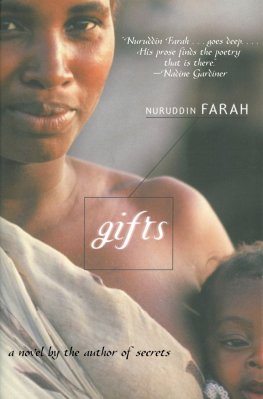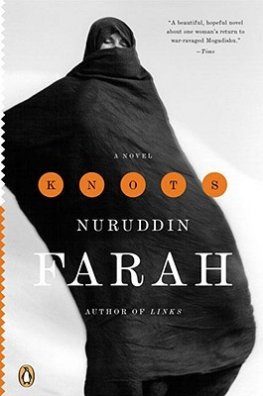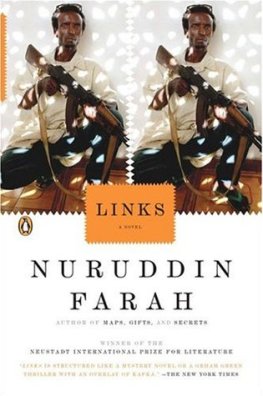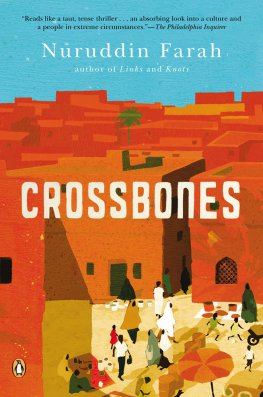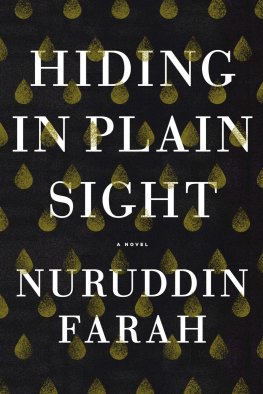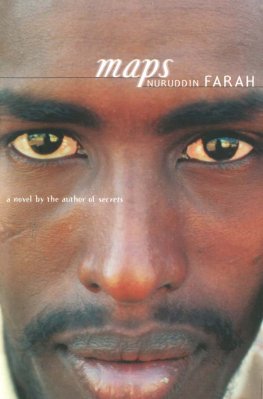Nuruddin Farah - Gifts
Here you can read online Nuruddin Farah - Gifts full text of the book (entire story) in english for free. Download pdf and epub, get meaning, cover and reviews about this ebook. year: 2011, publisher: Arcade Publishing, genre: Prose. Description of the work, (preface) as well as reviews are available. Best literature library LitArk.com created for fans of good reading and offers a wide selection of genres:
Romance novel
Science fiction
Adventure
Detective
Science
History
Home and family
Prose
Art
Politics
Computer
Non-fiction
Religion
Business
Children
Humor
Choose a favorite category and find really read worthwhile books. Enjoy immersion in the world of imagination, feel the emotions of the characters or learn something new for yourself, make an fascinating discovery.
- Book:Gifts
- Author:
- Publisher:Arcade Publishing
- Genre:
- Year:2011
- Rating:5 / 5
- Favourites:Add to favourites
- Your mark:
- 100
- 1
- 2
- 3
- 4
- 5
Gifts: summary, description and annotation
We offer to read an annotation, description, summary or preface (depends on what the author of the book "Gifts" wrote himself). If you haven't found the necessary information about the book — write in the comments, we will try to find it.
Gifts — read online for free the complete book (whole text) full work
Below is the text of the book, divided by pages. System saving the place of the last page read, allows you to conveniently read the book "Gifts" online for free, without having to search again every time where you left off. Put a bookmark, and you can go to the page where you finished reading at any time.
Font size:
Interval:
Bookmark:
Nuruddin Farah
Gifts
To
Monique Lortie,
Axmed Sr., and
Abdulqadir, my eldest brother, and his family
and in memory of
My mother, and
Angela Carter
With warmest love.
~ ~ ~
In writing this novel I have incurred many debts, the most important of which is owed to Marcel Mauss, author of The Gift, translated into English by I. Cunison. I am also indebted to many friends, including Paul Doornbos, Professor Mohamed Omar Beshir of Khartoum University, and Dr. Mechthild Reh: to whom my thanks.
I. A Story Is Born
1
In which Duniya sees the outlines of a story emerging from the mist surrounding her, as the outside world impinges on her space and thoughts.
Duniya had been awake for a while, conscious of the approaching dawn. She had dreamt of a restless butterfly; of a cat waiting attentively for the fretful insects shadow to stay still for an instant so as to pounce on it. Then the dark room lit up with the brightness of fireflies, agitated breaths of light, soft, quiet as foam. Faint from heat, Duniya watched the goings-on, supine. The butterfly flew here and there, movements mesmeric in its circling rainbow of colours. As if hypnotized, the cats eyes closed slowly, dramatically, and it fell asleep.
Fully awake, Duniya got out of bed.
Knowing she had to walk to work, she left home long before her children were up. She had timed herself on previous occasions: it would take forty-five minutes at a luxurious pace, allowing time for exchanging elaborate morning greetings and yesterdays gossip with any neighbours or colleagues she might meet.
In the event she only nodded a few times, acknowledging salutations without pause as if she did not know those who spoke them. She averted her eyes from several men in the side street, men in sarongs, towels draped round naked chests, men gargling gregariously, chewing on rumay sticks to clean their teeth. Duniya needed no reminder that the half-mud, half-brick houses in front of which these men stood had no running water, no wash-basins, no proper toilet facilities. She lived in one of the few houses in this district of Mogadiscio that boasted such amenities.
Wherever one looked, people were pouring out of opened doors. The streets were alive with activity: women chatting volubly with neighbours; groups of uniformed children on their way to school; infants, too small to carry their satchels, being led to kindergarten, Here and there someone was busy siphoning petrol from one vehicle into another. Most cars had an abandoned look, their bonnets up, engines cold. Occasionally one was driven past and everyone would stare, first at the vehicle as if seeing a miracle, then at the person at the wheel, perhaps hoping for a lift. The one time a taxi stopped, crowds converged on it and there was a scuffle, whereupon the driver sped off, safe in his securely locked car.
Contrary to expectation, there was a touch of gaiety in the air, with total strangers willing to engage in conversation on any topic, though uppermost in everyones mind were the scarcity of fuel and the increasingly frequent power cuts. Some people spoke knowledgeably about the politics of commodity shortages, guessing how long this would last. A man claiming to be in the know spoke of a government delegation going on a mission to the oil-producing Arab countries in the hope of returning with tankerfuls of petrol.
Duniya crossed an asphalt road which, though not sign-posted as such, was the boundary between two districts, one poor, in which she herself lived, the other middle-class if not well-to-do. From the nature of the conversation and the accents, she knew she was in Hodan. She entered a dirt road linking two tarred streets, a broad road that was quiet as a cul-de-sac. Suddenly, she felt violently upset; the surrounding silence disturbed her, making her breathing erratic. Seized with inexplicable fear, she sensed a chill in her bones, as if she had ventured into dangerous territory. She halted, not wanting to go further.
It was then that she spotted a cat resembling the one in her dream, crouched fearlessly before her, waiting to be picked up and cuddled. But Duniya did neither. She and the cat stared at each other and this increased her awareness of inner stress.
A few seconds later she saw in the hazy distance what at first seemed to be a butterfly with colourful wings revolving like spinning-tops. To her delighted surprise, it turned out to be a red-and-yellow-striped taxi, empty.
She got in, speaking not a word, and made herself comfortable in the back seat. Something told her not to interrogate her luck lest it should flee, but she did wonder if hiring the cab on her own might prove an exorbitant affair on a day like this. A discreet look in her wallet reassured her. But why wasnt the man moving? Had he spotted other potential passengers wanting to share? Then she realized she had not closed the taxi door. She clicked it shut and the car moved.
The driver touched the peak of the golf cap he wore, asking, Where would you like me to take you, Madam?
Maternity Benaadir Hospital, please.
At your service, Madam.
Duniya tried to dismiss a lurking suspicion: the man didnt talk, act or look like a taxi-driver. Phrases like At your service, Madam pinched his tongue in the way that new shoes press tightly on ones toes. He drove hesitantly, cautious with the controls, as if more accustomed to automatic transmission than manual gears. He reminded her of an inexperienced rider in the saddle of an unbroken horse. Several times the car stalled and he got out, apologizing, opened the bonnet, pulled at its wiry intestines, then got back in, only to repeat the process. He did not appear anxious, nor behave like a professional driver whose livelihood depended on the vehicle functioning. Rather, he was like a man condescending to cook for you while his maid and wife were both away: not wanting to be remembered for the ill-prepared result but for the humility with which he served you, the effort put into the task.
Moving at cruising speed, he said, As you may have gathered, Im not familiar with the idiosyncrasies of this taxi.
Then Duniya saw her face and his framed in the mirror, as if they had both waited all their lives for this one instant when their visages shared the space, sealed in a common fate. He was grinning, his jaw strong, his face shaven smooth as oilcloth, shining a friendly smile. It gave her an eerie sinking feeling, as if the earth were falling from under her. All of a sudden she did not want to be alone with him. Concurrently a realization came to her that she knew this man, knew his name.
Why pretend to be someone youre not, Bosaaso? she asked him.
Im afraid Ive no idea what youre talking about, he replied.
Disguise comes in handy to you men as soon as you run out of your natural masks. Men, she trailed off, as if the word described a species for which she had nothing but disdain.
She looked up at the sky. The sun seemed held in place by thin stilt-like strands of cloud, white as the branch of a deciduous tree without bark. Below the sun were two tiny dark clouds resembling foot-rests.
She and Bosaaso knew each other all right. She had been on night shift when his late wife spent a few laborious days in intensive care at the maternity hospital where Duniya was a senior nurse. Besides, they had a mutual friend in Dr Mire, principal obstetrician at the hospital and a boyhood friend of Bosaasos.
If I had known this was not a taxi I wouldnt have flagged it down, I promise you, she said.
But it isnt a taxi when Im driving it, Bosaaso said.
Why are you driving it anyway?
Because my own car is being serviced, thats why.
Font size:
Interval:
Bookmark:
Similar books «Gifts»
Look at similar books to Gifts. We have selected literature similar in name and meaning in the hope of providing readers with more options to find new, interesting, not yet read works.
Discussion, reviews of the book Gifts and just readers' own opinions. Leave your comments, write what you think about the work, its meaning or the main characters. Specify what exactly you liked and what you didn't like, and why you think so.

